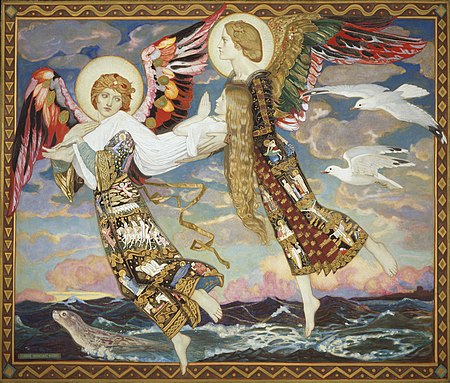
Abbess Image:Painting of St Bride carried by Angels,John Duncan 1913
Brigid is the Daughter of the Dagda, one of the more universal deities of the pagan Celtic world. She is known as the Goddess of Healers, Poets, Smiths, Childbirth and Inspiration; Goddess of Fire and Hearth and a patron of warfare or Briga. Her soldiers were called Brigands. Her name means "Exalted One." She is also known as Brigantia, Brid, Bride, Briginda, Brigdu, and Brigit. She is said to lean over every cradle. The lore and customs have continued to this day regarding Brighid, more vividly than all the other Gaelic deities combined.
The thing is that this pagan Goddess was a REAL LIVING PERSON. Brigid who was worshiped as a pagan goddess, met St Patrick and was converted to Christianity....Patrick baptized her and her pagan shrine at Kildere became a convent/Abbey where all who were sick or poor could still find healing and help. She became a nun and set up and presided over the monastery of Kildare as its abbess. As a result, Kildare became significant in the spread of Christianity in Ireland. The stories of her compassion include episodes of the multiplication of food for the poor, and, on one occasion, of turning water into beer to satisfy the thirst of some visiting clergy.
Brigid was holy and compassionate, with a deep love of the poor. In Ireland and in places on the continent of Europe influenced by Ireland, Brigid became second only to Patrick in significance. Understandable, after all it's not a common occurance for a pagan goddess to become a Christian saint.
BORN: c. 451,
Faughart, Dundalk, Ireland (modern county Leuth).
DIED: c. 525, Kildare, Ireland
 Welcome
Welcome Calendar
Calendar Today's Word
Today's Word Lauds
Lauds Terce
Terce Sext
Sext None
None Vespers
Vespers Compline
Compline Matins
Matins